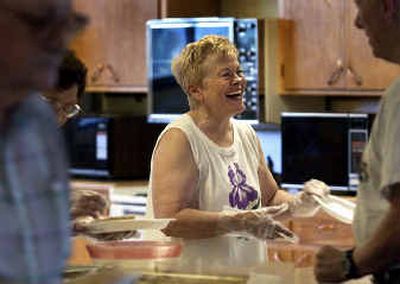Six agencies make pitches for funding

Beau Mellem worked three jobs, but he still couldn’t cover his medical expenses. When doctors had to replace a valve in his heart last year, the 23-year-old Spokane Valley resident turned to Project Access for help.
Now Project Access, an agency that gives specialized medical care to low-income patients free of charge, is turning to the city of Spokane Valley. It was among six agencies at the City Council meeting Tuesday night that asked for money from the 2005 budget.
“(Mellem) couldn’t get treatment without Project Access,” said Dr. Samuel Selinger, medical director of the program. “Within three weeks of getting out of the hospital he was back to work.”
But an hour after the presentations, the council was discussing how to balance its 2005 budget by cutting back on services next year. Cutbacks could mean fewer police officers will protect the city, among other possibilities. The city needs to trim $500,000 from what it had hoped to spend in 2005.
But before the gloomy budget discussion ensued, four human-services and two economic-development agencies made their cases.
• Spokane Valley Meals on Wheels asked for $8,200 so that it can start feeding senior citizens at the Spokane Valley Senior Center five days a week next year, rather than just two days. The program didn’t receive city money last year.
• Project Access requested $25,000, the same amount it received this year. Doctors donate their time and services to Project Access, but the program needs money to buy medicine and supplies.
• The Valley Community Center, which provides housing, clothes and other services to the poor, asked for $14,283. It received $4,000 this year. The community center would use the money to help pay the salary of a staff member who would help families struggling to pay their utility bills.
• The Chase Youth Commission, which has programs for young people, asked for $10,000. Last year, the commission received $2,000.
• The International Trade Alliance, an agency that helps businesses export their goods, requested $35,000. The city gave that program $14,000 this year.
• The Spokane Area Economic Development Council, which spurs economic growth in the region through marketing and by recruiting businesses, asked for $175,000. Spokane Valley gave the EDC $55,000 this year.
Proportionately, Spokane Valley gives less money to human services than other cities do. The $31,000 it gave to such programs last year was just one-tenth of 1 percent of its general fund.
By comparison, the city of Spokane spent more than 1 percent on human services this year, Spokane spokeswoman Marlene Feist said. On top of that, Spokane allocated money to programs budgeted separately, such as the East Central Community Center.
The city of Kent, which has about 4,000 fewer people than Spokane Valley, spent more than 2 percent of its general fund on human services, said Cliff Craig, Kent’s assistant finance director.
After Tuesday’s meeting, council members said it’s a matter of money.
“Outside agencies will be funded as we can afford them,” Councilman Richard Munson said. “We’ll do what we can.”
Councilman Steve Taylor said cities don’t have the same responsibility to pay for human services as state and federal governments do.
But earlier Tuesday, Meals on Wheels director Pam Almeida said, “The health of a community can be measured by how they take care of the vulnerable.”
“A community is responsible for all its citizens,” she said.
During the next several weeks, the city’s staff will address community groups about the budget. Public hearings will follow in September.
City Manager David Mercier wanted to increase spending in all the city’s departments by 1 percent next year. But even that small tick upward would put Spokane Valley $512,000 in the hole because sales-tax revenues have been weak.
Mercier plans to propose a specific 2005 budget at the council’s Sept. 14 meeting. The council gave him the go-ahead to suggest cuts in programs where there’s wiggle room.
“Nobody is keen on their taxes increasing,” Mercier said. “People are similarly not keen on their services being reduced. But we’re going to have to reach the match line here.”
As a theoretical example of how to make ends meet, Mercier said cutting five police positions would save $500,000. Beyond that, no other specifics were discussed.
“My hair is getting grayer by the minute,” Munson said.